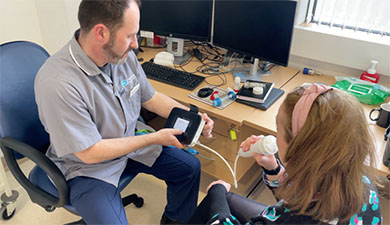Ulster Hospital respiratory nurse says get in control of your asthma and don’t let it control you
• In Northern Ireland, one out of every 16 adults and one out of 11 children have an Asthma diagnosis.
As we mark World Asthma Day on May 7th, it is important to understand if you suffer from it, that Asthma education empowers you and information is the key to controlling it said Ulster Hospital Respiratory Nurse Specialist, Kevin O’Brien.
World Asthma Day is a global initiative aimed at improving Asthma awareness, a common but potentially life-threatening condition.
In the UK, there is the possibility for a person to have a life-threatening asthma attack every ten seconds.
A common lung condition, Asthma is caused by swelling (inflammation) of the breathing tubes that carry air in and out of the lungs.

This makes the tubes highly sensitive, so they temporarily narrow which causes occasional breathing difficulties.
This can happen randomly however it can occur after exposure to a trigger.
Identifying and avoiding your Asthma triggers can help you keep your symptoms under control. There are a number of Asthma triggers which include;
- Allergies (animal fur or pollen and house dust mites),
- Smoke, air pollution and cold air,
- Exercise,
- Infections like cold or flu.
Kevin added: “It is important to remember that Asthma is a serious condition that can cause a number of problems and complications.
“There is a risk of severe asthma attacks which can be life-threatening, however, with the right treatment plan, symptoms can be kept under control.
“In Northern Ireland we have over 131,969 people diagnosed with Asthma.
“One out of every 16 adults and one out of 11 children have an Asthma diagnosis.
“We need to make sure that people are accurately diagnosed, that they know what medication they should use and most importantly how to use it.”
Kevin added that a patient or those living with Asthma can keep their condition under control by creating their own “personal Asthma Action Plan” under the guidance of their GP or Nurse Practitioner.

“It is important for a person to know the symptoms, what triggers to look out for and what action to take.
“If a person has to use their prescribed reliever inhaler on more than two occasions in the week, then we would deem their asthma uncontrolled.
“We would recommend they need to see their GP to look at their medication management and try to work on a plan to re-establish control.
“They should be using their prescribed preventer inhaler every day even when they do not have any Asthma symptoms.”
Kevin said that those with Asthma should not be unsure of asking their GP or Asthma Nurse to ‘check their inhaler technique.’
“By doing this it will ensure that the medication is flowing into the lungs properly.
“If you are concerned about your asthma control or your symptoms then please speak to your GP or your Practice Nurse.
“Your Asthma symptoms should not interfere with your daytime activities, and you should be able to be active and exercise.
“The message is to be in control of your asthma – don’t let your asthma control you!”
·
·
























